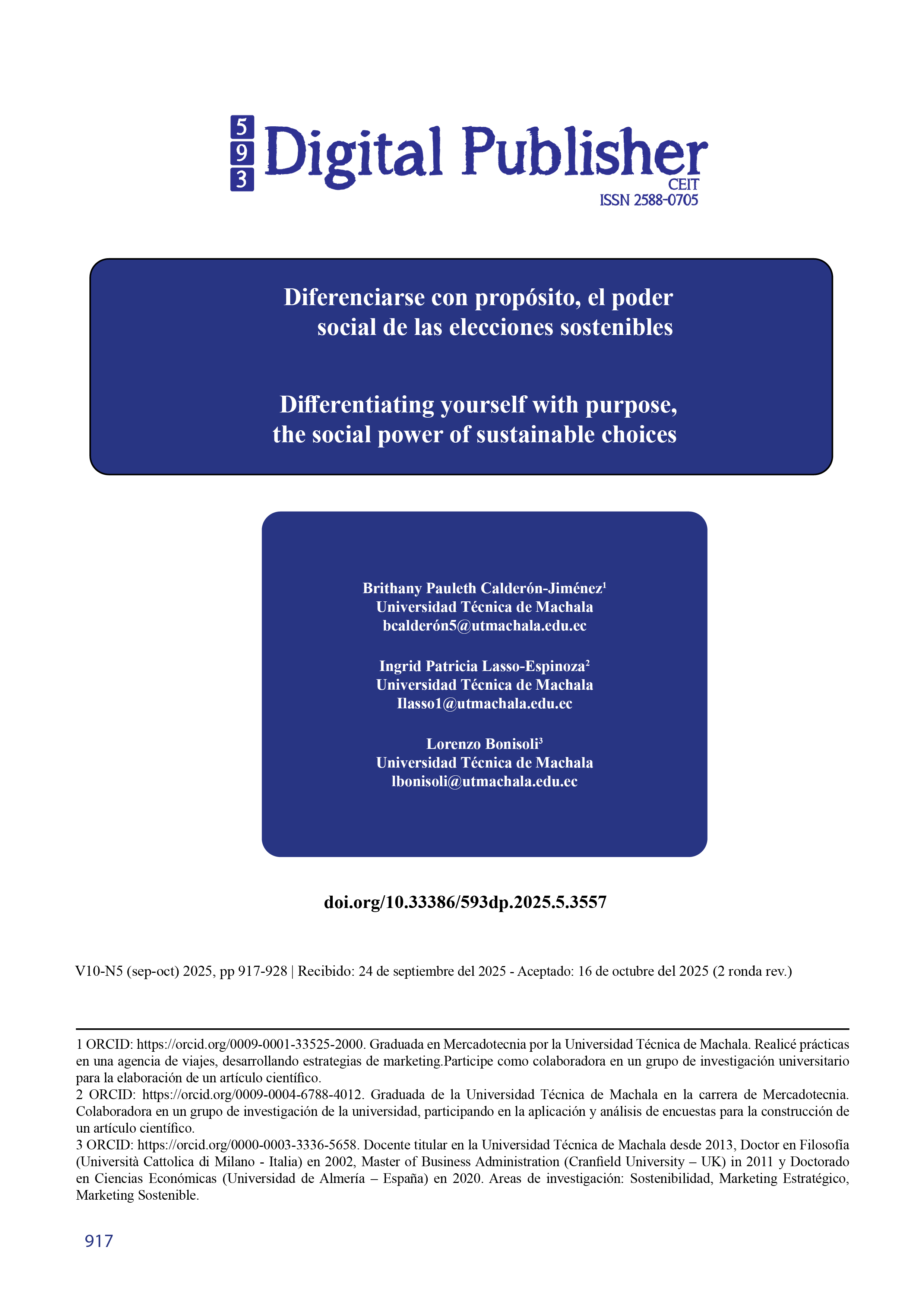Diferenciarse con propósito, el poder social de las elecciones sostenibles
Contenido principal del artículo
Resumen
El consumo responsable ha dejado de ser percibido únicamente como una tendencia pasajera para consolidarse como una decisión con un fuerte trasfondo social y emocional. El propósito de esta investigación, llevada a cabo con 225 jóvenes de la Generación Z en la ciudad de Machala, Ecuador, fue entender cuáles son los verdaderos factores que impulsan la preferencia por alternativas sostenibles. El instrumento consistió en una encuesta estructurada de 16 ítems, en escala Likert de 5 puntos, se determinó, por medio de un análisis SEM-PLS mediante el software SmartPLS 4.1.1.53, y principales coeficientes β, p, R², que algunas emociones, como el narcisismo y la envidia personal verde, desempeñan una función importante en la adopción de comportamientos responsables. Esto demuestra que incluso el anhelo de sobresalir y diferenciarse socialmente puede dirigirse hacia prácticas sustentables. En cambio, el efecto de la necesidad de estatus no fue significativo, lo que indica que no todas las motivaciones relacionadas con el reconocimiento social tienen el mismo impacto en estas decisiones. Los descubrimientos muestran que las elecciones sostenibles no se generan solo a partir de la racionalidad, sino que también están fuertemente influenciadas por emociones intensas y valores compartidos.
Descargas
Detalles del artículo

Esta obra está bajo una licencia internacional Creative Commons Atribución-NoComercial-CompartirIgual 4.0.
1. Derechos de autor
Las obras que se publican en 593 Digital Publisher CEIT están sujetas a los siguientes términos:
1.1. 593 Digital Publisher CEIT, conserva los derechos patrimoniales (copyright) de las obras publicadas, favorece y permite la reutilización de las mismas bajo la licencia Licencia Creative Commons 4.0 de Reconocimiento-NoComercial-CompartirIgual 4.0, por lo cual se pueden copiar, usar, difundir, transmitir y exponer públicamente, siempre que:
1.1.a. Se cite la autoría y fuente original de su publicación (revista, editorial, URL).
1.1.b. No se usen para fines comerciales u onerosos.
1.1.c. Se mencione la existencia y especificaciones de esta licencia de uso.
Citas
Anisimova, T., & Vrontis, D. (2024). The food you can trust: The moderating role of age in the relationship between consumer values and organic food trust. Journal of Business Research, 182, 114803. https://doi.org/10.1016/j.jbusres.2024.114803
Bonisoli, L., & Castillo Leyva, K. L. (2022). Creencias normativas y confianza: una adaptación del modelo de aceptación tecnológica al e-commerce durante la pandemia por COVID-19 en Ecuador. Innovar, 32(86), 135–149. https://doi.org/10.15446/innovar.v32n86.104666
Chakraborty, S., & Chattaraman, V. (2025). Predicting self-transcendental and self-serving consumption through spirituality, self-concept clarity and consumer values. Journal of Consumer Marketing. https://doi.org/10.1108/JCM-06-2024-6935
Fouad, A. M., Abdullah Khreis, S. H., Fayyad, S., & Fathy, E. A. (2025). The dynamics of coworker envy in the green innovation landscape: Mediating and moderating effects on employee environmental commitment and non-green behavior in the hospitality industry. Tourism and Hospitality Research. https://doi.org/10.1177/14673584251324618
Gao, H., Winterich, K. P., & Zhang, Y. (2016). All That Glitters Is Not Gold: How Others’ Status Influences the Effect of Power Distance Belief on Status Consumption. Journal of Consumer Research, 43(2), 265–281. https://doi.org/10.1093/jcr/ucw015
Kapoor, K., Maurya, M., & Bhandari, R. S. (2025). Factors impacting purchase intention towards masstige brands: A SEM based analysis of young consumers in India. International Journal of System Assurance Engineering and Management, 16(5), 1875–1884. https://doi.org/10.1007/s13198-025-02739-y
Konuk, F. A., & Otterbring, T. (2024). The dark side of going green: Dark triad traits predict organic consumption through virtue signaling, status signaling, and praise from others. Journal of Retailing and Consumer Services, 76, 103531. https://doi.org/10.1016/j.jretconser.2023.103531
Le, N. T. C., & Quynh, V. T. (2025). Vietnamese Gen Z consumers’ intentions toward carbon offsetting in transportation: An extended Theory of Planned Behavior approach. Research in Transportation Business & Management, 62, 101443. https://doi.org/10.1016/j.rtbm.2025.101443
Lee, Y.-C. (2021). Are Facebook check-ins always good for branding? The green-eyed monster in Chinese culture. Electronic Commerce Research and Applications, 50, 101101. https://doi.org/10.1016/j.elerap.2021.101101
Lou, W., Lu, S., Li, M., & Taghizadeh-Hesary, F. (2025). Determinants of green energy investment—financial drivers and equitable transition. Humanities and Social Sciences Communications, 12(1), 489. https://doi.org/10.1057/s41599-025-04760-9
Mahasuweerachai, P., & Suttikun, C. (2022). The Effect of Green Self-Identity on Perceived Image, Warm Glow and Willingness to Purchase: A New Generation’s Perspective towards Eco-Friendly Restaurants. Sustainability, 14(17), 10539. https://doi.org/10.3390/su141710539
Nguyen, L., & Pham Huynh, T. (2024). Factors influencing carbon-labeled product purchase intentions: A case study in Vietnam. Innovative Marketing, 20(1), 146–159. https://doi.org/10.21511/im.20(1).2024.13
Peng, D., & Huang, C.-H. (2025). Exploring the hierarchy of motivations in the wine purchase behavior of Chinese young wine consumers. International Journal of Wine Business Research, 37(2), 293–314. https://doi.org/10.1108/IJWBR-04-2024-0015
Phau, I., Akintimehin, O. O., Shimul, A. S., & Lee, S. (2025). Unlocking the motivations behind vintage luxury desire. Spanish Journal of Marketing - ESIC, 29(3), 351–370. https://doi.org/10.1108/SJME-06-2023-0167
Sakellaropoulo, M., & Baldwin, M. W. (2007). The hidden sides of self-esteem: Two dimensions of implicit self-esteem and their relation to narcissistic reactions. Journal of Experimental Social Psychology, 43(6), 995–1001. https://doi.org/10.1016/j.jesp.2006.10.009
Shimul, A. S., Cheah, I., & Rahman, M. (2025). Consumers’ dark personality traits drive gluckschmerz: the interplay of competitiveness and brand love. Journal of Brand Management, 32(2), 112–130. https://doi.org/10.1057/s41262-024-00372-x
Simonetti, A., Bigne, E., & Rico Navas, L. F. (2025). Consumer brand choice in the metaverse: Exploring personal and social factors. Technological Forecasting and Social Change, 213, 124033. https://doi.org/10.1016/j.techfore.2025.124033
Tilley, J., & Hobolt, S. (2025). Narcissism and Affective Polarization. Political Behavior, 47(2), 599–618. https://doi.org/10.1007/s11109-024-09963-5
Wang, Y., Chung, T., & Lai, P. (2022). Go Sustainability—Willingness to Pay for Eco–Agricultural Innovation: Understanding Chinese Traditional Cultural Values and Label Trust Using a VAB Hierarchy Model. Sustainability, 15(1), 751. https://doi.org/10.3390/su15010751
Wooten, D. B., Harrison, R. L., & Mitchell, N. (2011). Benign envy: is there a dark side of light green? AMS Review, 1(3–4), 137–139. https://doi.org/10.1007/s13162-011-0016-z
Yadav, R., Giri, A., & Alzeiby, E. A. (2024). Analyzing the motivators and barriers associated with buying green apparel: Digging deep into retail consumers’ behavior. Journal of Retailing and Consumer Services, 81, 103983. https://doi.org/10.1016/j.jretconser.2024.103983
Zheng, C., Ling, S., & Cho, D. (2023). How Social Identity Affects Green Food Purchase Intention: The Serial Mediation Effect of Green Perceived Value and Psychological Distance. Behavioral Sciences, 13(8), 664. https://doi.org/10.3390/bs13080664




